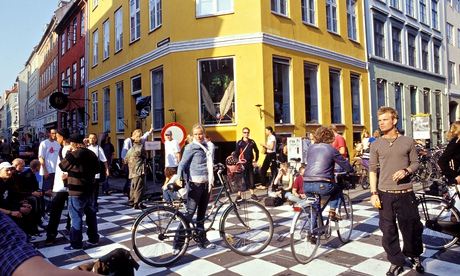
I moved to Copenhagen when I left Aarhus to study biology at the university. It’s not a city you immediately fall for, unlike Berlin or Paris; it’s more of a Pandora’s box. The longer you spend there, the more corners you get to know, and the more you realise how much it offers.
In winter, Copenhagen can be spectacular, especially when the big lakes in the middle of the city are frozen and the sun has risen. In the past the lakes were there to prevent disaster: they were “fire stoppers” and known as branddamme (fire ponds).
There’s no better view than the one from the top of the tower in Copenhagen zoo. You can see across the city and all the way to Sweden. I spent so much time in the zoo – you have to when you study biology – and then with biology being where I get my inspiration as a writer, I’ve probably spent more hours at the tower and the zoo than anywhere else.
Avoid Strøget, which is a tourist trap and full of chain stores. Instead, wander the streets parallel to this pedestrianised area – they are far more interesting and fun than the main street itself. Aim for the Latin Quarter, just to the east of Nørregade, if you want good shopping.
Everyone cycles in Copenhagen. Bikes rule. It’s the easiest, most logical way to get around, and there are cycle paths everywhere. You can rent bikes from the City Bike scheme – just like you do with Boris bikes in London. It costs £2.70 an hour.
If there were as many serial killers in real life as there are in Scandi crime, there wouldn’t be many of us Danes left, so don’t visit expecting a crime wave. But I do think there can be a bad atmosphere amid Copenhagen’s nightlife at times. The city is full of happy young people and some drink too much and don’t always stay happy. God, I sound like a grandmother!
Bookshops in Copenhagen were once somewhere you went, bought your book, and left. That’s why I liked travelling abroad, where there was a bookshop culture; where you could sit, look at the books and have a coffee. Fortunately, it’s starting to happen in Copenhagen, too. Politikens Boghal, on Vestergade, near Tivoli, is our most modern bookshop; you can buy drinks and snacks and it has a huge stock. But while the shop is very efficient it isn’t hyggelig. This is an important Danish word and is at the core of our culture. But it’s hard to translate – “cosiness” comes close, but it is also about conviviality, intimacy and comradeship. So, if you want a hyggelig bookshop go to Thiemers Magasin in Tullinsgade – the area around it has much more charm than the city centre, too.
There’s an island in Copenhagen called Amager; it’s where the airport is but it’s still only 10 minutes from the city by metro. It didn’t use to be a good area but then it was redeveloped. It now has a 6km-long artificial beach and wonderful high buildings with super-popular apartments. Amager is now a mixture of hip and traditional places. But the city also left two huge nature reserves there: Amager Fælled and Kalvebod Fælled. They are wild and uncultivated. You can ride horses or go for a run.
The Danes are good at making healthy food that’s also incredibly tasty, and for that I love the fish plate at Café Europa, in the middle of the city, on Amagertorv.
You need to download the metro app to your phone, without it you’ll waste time looking for ticket machines and trying to make sense of mad maps. The app’s called Mobilbilletter Hovedstaden and tells you where you are and how to get to where you want to go. Don’t get caught without a ticket either, the fines are harsh.
I had to check if my favourite bar was still there because, honestly, I don’t go out and drink that often anymore, but when I did it was at Mexibar. It’s a lively, fun place on Elmegade in Nørrebro, with super-good cocktails. If you want to go dancing afterwards, the nightclub Rust is around the corner.
The food at Sticks’n’Sushi is so yummy you wake up at 3am with a crazy craving for it. It’s a Danish sushi and grill restaurant, which has become a little bit of a chain. I really love the branch that’s on the top floor of the Tivoli Hotel in Copenhagen. You feel you’ve travelled to a posh and exotic place when you eat there.
It’s now cool to be in the Danish police or to want to join up, which is a result of all of the Scandi-crime books, TV series and films. I’m currently watching a TV documentary about law enforcement, called The Police Academy, which goes behind the scenes and shows all the studying and fitness training it takes to become a police officer. You can see why a young person would be attracted to it.
• The Arc of the Swallow by Sissel-Jo Gazan is published by Quercus, hardback £16.99. To buy a copy for £13.59 including UK p&p visit bookshop.theguardian.com or call 0330 333 6846

